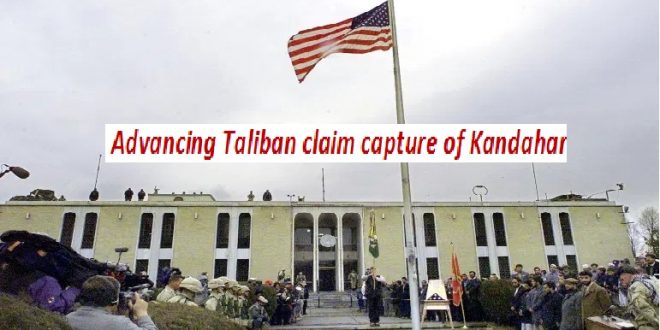13-08-2021
By SJA Jafri + Bureau Report + Agencies
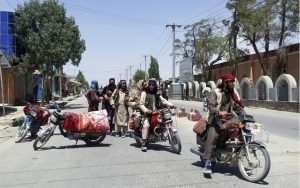 KABUL/ ISLAMABAD/ WASHINGTON: The Biden administration, struggling to contain the rapid collapse of much of Afghanistan to Taliban forces, on Thursday announced it was pulling most U.S. Embassy personnel out of Kabul and urged American citizens for the second time in a week to leave the country immediately.
KABUL/ ISLAMABAD/ WASHINGTON: The Biden administration, struggling to contain the rapid collapse of much of Afghanistan to Taliban forces, on Thursday announced it was pulling most U.S. Embassy personnel out of Kabul and urged American citizens for the second time in a week to leave the country immediately.
Several thousand U.S. troops will be dispatched to Afghanistan, mainly the Kabul airport, to help with what is shaping up as a military-run partial evacuation.
It was a significant escalation in a violently deteriorating situation. The urgent moves came as the Islamist Taliban group, in its quest to topple the U.S.-backed government, reportedly conquered Afghanistan’s third-largest city and pushed its second city, Kandahar, to the brink. Afghan refugees have flooded Kabul, many sleeping in the streets, and talks to reach a political solution are going nowhere.
State Department spokesman Ned Price said that the administration will substantially reduce its “civilian footprint” in Afghanistan to a “core diplomatic presence” in face of the grave violence spreading across the country, and that many employees will be relocated to the fortified Kabul airport for safety.
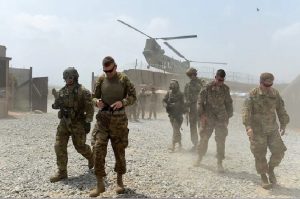 The moves are also likely to dismay an already desperate Afghan population. Many say they fear imprisonment, torture, repression and execution at the hands of the Taliban who ruled brutally in the 1990s. The group says it has modernized, but there is little evidence to support that. U.S. officials and human rights groups say they are already receiving numerous reports of atrocities by Taliban forces, including executions of surrendering soldiers.
The moves are also likely to dismay an already desperate Afghan population. Many say they fear imprisonment, torture, repression and execution at the hands of the Taliban who ruled brutally in the 1990s. The group says it has modernized, but there is little evidence to support that. U.S. officials and human rights groups say they are already receiving numerous reports of atrocities by Taliban forces, including executions of surrendering soldiers.
“The embassy remains open,” Price said though he would not say if that meant in its current location. “We will complete our priority work.” But it clearly will become a skeleton operation.
Already, the State Department had reduced the number of its “nonessential” personnel in Kabul, once the site of one of the largest U.S. diplomatic missions in the world, and is constantly reviewing broader evacuation plans, officials said.
Officials hope to reduce the number of U.S. citizens in Afghanistan to avoid the need to mount large rescue operations if Kabul falls, which some analysts now believe could happen within weeks as the United States winds down its longest war and withdraws nearly all military forces. It especially does not want a Saigon-reminiscent, last-minute rescue of Americans at the embassy if Taliban forces march into the capital.
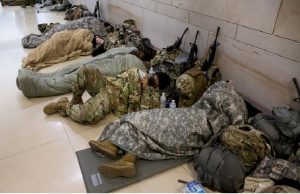 Yet the sight of helicopters airlifting American diplomats out of the Kabul embassy, and U.S. transport carriers ferrying Americans out of the country, would probably conjure up those images anyway and sow panic.
Yet the sight of helicopters airlifting American diplomats out of the Kabul embassy, and U.S. transport carriers ferrying Americans out of the country, would probably conjure up those images anyway and sow panic.
The administration will also speed up the processing of special visas for Afghan translators and others who worked for U.S. military and diplomatic missions, part of a program Washington created to attempt to provide a haven for the former employees but the process has moved slowly and many Afghans say they cannot even reach Kabul nor cross Taliban-controlled borders to avail themselves of the visas.
Senior national security officials launched a round of urgent consultations in the last 24 hours with Afghan President Ashraf Ghani. The Biden administration, which privately complains of debilitating divisions within the Afghan leadership, insists it will not change course in its withdrawal of U.S. military forces by Sept. 1, and has placed the responsibility for security 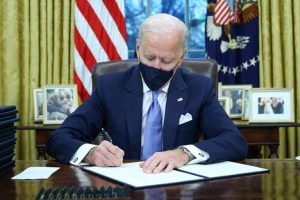 squarely on the shoulders of the weak Afghan government and its army.
squarely on the shoulders of the weak Afghan government and its army.
“They’ve got to fight for themselves, fight for their nation,” President Biden said earlier this week. “But they’ve got to want to fight.”
Pentagon spokesman John Kirby said Thursday that the removal of American officials from the Kabul embassy and from the airport will probably include airlifts. About 3,000 soldiers and Marines will join 650 U.S. service members already deployed in Kabul, Kirby said. Another 3,000 troops, including members of the 82nd Airborne out of Ft. Bragg, N.C., will be deployed as backup in nearby Qatar.
“This is a temporary mission … a very narrowly focused mission of safeguarding the orderly reduction of civilian personnel out of Afghanistan,” Kirby said. Pressed repeatedly, he insisted it was not a combat mission, something that U.S. forces have not been involved in in Afghanistan for months, because Kabul was not yet a combat zone.
In Afghanistan, the Taliban claimed to have captured Herat, the country’s third-largest city, and has taken 11 of 34 provinces, roughly two-thirds of the country.
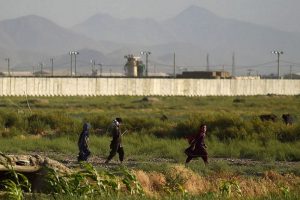 Earlier, the Taliban have claimed the capture of Afghanistan’s second largest city, Kandahar, in what would be a major win for the militants.
Earlier, the Taliban have claimed the capture of Afghanistan’s second largest city, Kandahar, in what would be a major win for the militants.
The city was once the Taliban’s stronghold, and is strategically important as a leading trade hub.
Several cities fell on Thursday in the most dramatic string of victories yet.
The United States said it is sending nearly 3,000 troops back into Afghanistan to help evacuate staff from the American embassy.
The US said it was sending troops to the airport in Kabul to help evacuate a “significant” number of embassy staff on special flights.
The UK said it was also deploying about 600 troops on a short-term basis to provide support to British nationals leaving the country. The number of staff working at the British embassy in Kabul has been reduced to a core team.
The insurgents have moved quickly, seizing new territories as US and other foreign troops withdraw after 20 years of military operations.
Within hours of each other on Thursday some of Afghanistan’s most important cities were captured – Herat, Ghazni and Qala-I-Naw came under Taliban control.
A Taliban spokesman also announced that “Kandahar is completely conquered”, but this has not been confirmed.
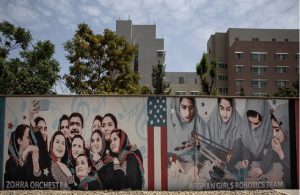 Sources have told the BBC that the southern city of Lashkar Gah, the capital of Helmand province, has also been taken by the militants, although this has also not been confirmed.
Sources have told the BBC that the southern city of Lashkar Gah, the capital of Helmand province, has also been taken by the militants, although this has also not been confirmed.
The Taliban now control most of northern Afghanistan and about a third of the country’s regional capitals.
There are increasing concerns that the militants will continue their lightening speed offensive toward the capital, Kabul, where tens of thousands of civilians have fled violent street fighting.
“The speed of the Taliban’s advance has shocked even seasoned military analysts,” the BBC’s South Asia Editor, Anbarasan Ethirajan said.
Why is Kandahar so important?
Kandahar is the Taliban’s birthplace and former stronghold – taking control of the city would be a significant prize for the militants.
They had occupied the city’s outskirts for a number of weeks before launching their attack on the centre.
On Wednesday, the Taliban breached Kandahar’s central prison, and on Thursday, images on social media reportedly showed insurgents in the city centre.
A resident told the AFP news agency that government forces appeared to have withdrawn en masse to a military facility outside the southern city.
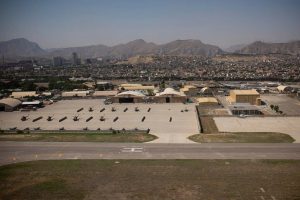 Kandahar is considered strategically important because of its international airport, its agricultural and industrial output and its position as one of the country’s main trading hubs.
Kandahar is considered strategically important because of its international airport, its agricultural and industrial output and its position as one of the country’s main trading hubs.
Ghazni, captured on Thursday, is a significant gain for the Taliban as it is on the Kabul-Kandahar motorway, linking militant strongholds in the south to the capital, Kabul.
Meanwhile Herat, an ancient Silk Road city, had been under siege for weeks before security forces retreated to army barracks. Video on social media shows the insurgents running through a central street firing their weapons, and the Taliban flag was seen flying over the police headquarters.
“Late afternoon everything changed. They (the Taliban) entered the city in rush. They raised their flags in every corner of the city,” Herat resident Masoom Jan told AFP.
Meanwhile, the US embassy in Kabul said it was hearing reports that the Taliban were executing Afghan troops who were surrendering, saying it was “deeply disturbing and could constitute war crimes”.
More than 1,000 civilians have been killed in Afghanistan in the past month, according to the UN.
Just this week thousands of people from Northern provinces have become internally displaced, travelling to Kabul to seek safety. An estimated 72,000 children arrived in the capital in recent days and are mostly sleeping on the streets, according to Save the Children.
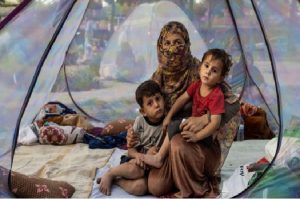 Makeshift camps have been established on scrubland on the outskirts of the capital, while many others have reportedly been sleeping on the streets or in abandoned warehouses.
Makeshift camps have been established on scrubland on the outskirts of the capital, while many others have reportedly been sleeping on the streets or in abandoned warehouses.
“We have no money to buy bread, or get some medicine for my child,” a 35-year-old street vendor who fled Kunduz province after the Taliban set fire to his home told the BBC.
In response to the insurgency, the German government has threatened to end its annual financial support of $500m (£360m) to Afghanistan if the Taliban gains complete control of the country.
Germany has also suspended the forced repatriation of Afghan citizens whose asylum applications have failed. The French and Danish government say they will also following the same policy.
What is the Afghan government doing?
The Afghan president, Ashraf Ghani, has so far failed to unite a host of fractured Afghan militias against the Taliban.
On Wednesday, he flew to the northern city of Mazar-i-Sharif – traditionally an anti-Taliban bastion – to try to rally pro-government forces.
He also held crisis talks with ethnic Uzbek warlord Abdul Rashid Dostum and prominent ethnic Tajik leader Atta Mohammad Noor about defending the city.
For years, Ghani tried to sideline the warlords in an attempt to boost the Afghan National Army, and now he is turning to them in his hour of need, the BBC’s Ethirajan Anbarasan says. Earlier this week, the president also agreed to arm pro-government militia.
 Pressmediaofindia
Pressmediaofindia
